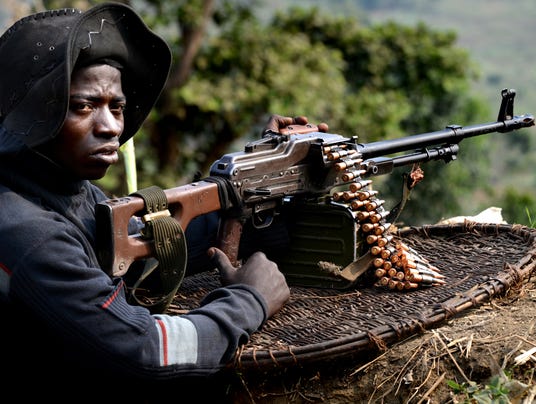 |
| M23 MOVEMENT |
"The dogs will eat them later. They won't even be here tomorrow," says M23 Capt. John Lukamata of three children whom his soldiers say were killed by a government helicopter attack and buried under the mound.
"I tell you, these people are animals," Lukamata says in the nearly abandoned village, the smell of burned flesh wafting through the air.
The deadliest war in modern African history is entering a new phase. For two decades, at least 20 armed groups have been fighting in this stunning landscape of jungle, volcanoes and rolling farms producing coffee, sugar cane and maize in a massive country about the size of the Eastern USA. Millions of people have died, most from starvation and disease brought on by relentless combat that has stymied intervention by the United Nations and forced millions of people to plod from village to village in search of safety.
In a first-of-its kind arrangement, the U.N. Security Council authorized an offensive military force to join Congolese government soldiers in operations against the rebels. The 3,000-troop intervention brigade will be in addition to the peacekeeping force of 17,000 U.N. soldiers — the largest U.N. peacekeeping mission in the world. The U.N. mission, which has been trying to stabilize the Congo since 1999, is funded with an annual budget of $1.35 billion.
Much of the fighting is in eastern Congo, where forces on both sides are accused by the United Nations of raping tens of thousands of women, men, girls and boys as a weapon of war.
Rebels in far-flung regions of a country that is home to more than 200 different ethnic groups say they want a measure of freedom from the dictates of the central government. They say the government is corrupt and refuses them a fair share of the country's significant deposits of gold, platinum and coltan, a mineral critical to computer processors.
 |
"The use of force needs to be connected to a larger diplomatic strategy," says John Prendergast, co-founder of the Enough Project, who has worked in the region for decades. "The brigade itself is small, not remotely able to deal with scope and scale of the armed groups in Congo. ... It is going to be at its best, a tool that helps implement a larger political strategy that addresses the core concerns of the combatants."
M23 says it is fighting for a just peace, but some of its actions are far from just, according to a July 22 report by Human Rights Watch. The report accused the group of war crimes such as the summary execution of dozens of people in North Kivu and the rape of 66 women and girls.
Col. Innocent Kayina, commander of operations for M23, who was named in the report, denies the allegations as propaganda from the Kabila government.
"How could we rape and kill these civilians if we live amongst them?" he says.
Government troops and its alleged allied militias made up mostly of ethnic Hutus, such as Democratic Forces for the Liberation of Rwanda, are also accused of similar heinous acts against civilians, according to the report.
The violence is a never-ending horror for the people in eastern Congo, who have had their lives ruled by warfare since the Rwandan genocide in 1994. As many as 1 million ethnic Tutsis were killed by rival Hutus in that genocide just over the border.
The fight spilled into Congo when the defeated Rwandan Hutus fled for Hutu enclaves in Congo and Rwanda's military chased them. Rwanda still wields influence in eastern Congo, says Mende, the Congolese government spokesman.
The ethnic rivalries continue to be a factor in the war. M23 is made up of mostly Tutsis, and the Congolese government has many Hutus sympathetic to the interests of their brethren.
The United States has backed the increase in the U.N. intervention brigade. In June, the State Department named former senator Russ Feingold as a special envoy to the region. Experts say more must be done.

No comments:
Post a Comment